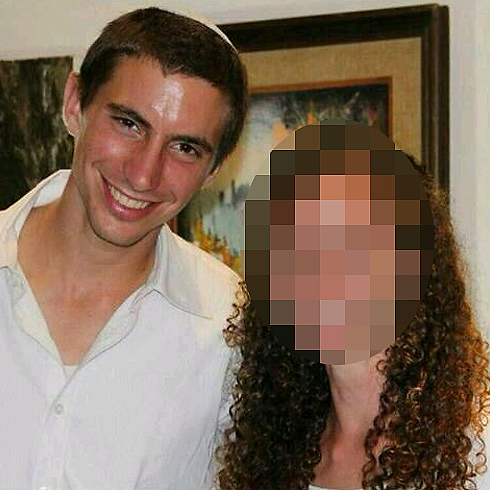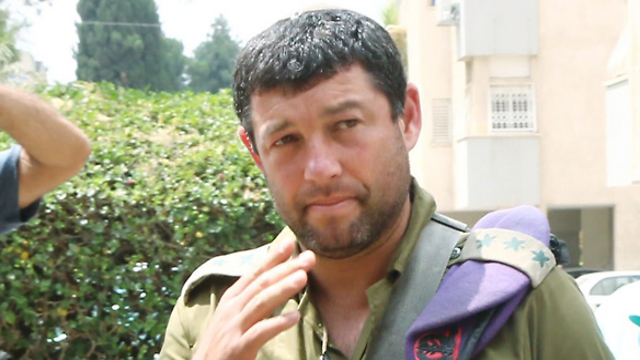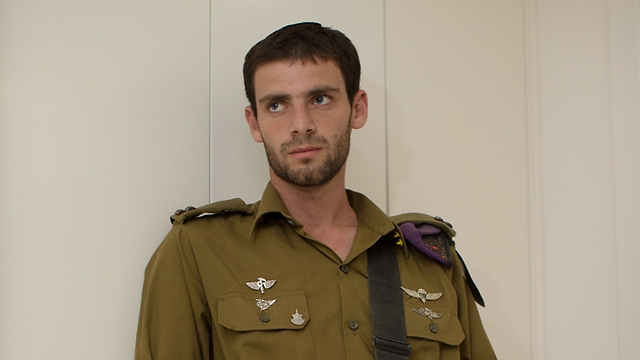
Hannibal Directive: Exclusive tapes reveal details of IDF's Black Friday
Ynet obtains recordings of internal IDF communication after kidnapping of Givati Brigade officer Lt. Hadar Goldin as military police decides on whether to pursue criminal case against officers.
Take a look inside the IDF's Hannibal Directive and the events leading up the capture and death of Givati Battalion Second Lieutenant Hadar Goldin, one of the IDF's heros during Israel's 50 day war with Hamas. Ynet has obtained footage which has never before been or seen heard of the events of August 1st, which has become known as Black Friday.
Four months after Sec.-Lt. Hadar Goldin was captured (and later killed) during Operation Protective Edge, and only days ahead of the Chief Military Prosecutor's decision on whether to launch a criminal investigation into the conduct of the IDF officers who led the pursuit after the captive soldier in Rafah, audio recordings from the IDF's communication system obtained by Ynet shed light on the dramatic moments of that fateful Friday morning.
The recordings shed light into a dramatic event in which Sec.-Lt. Goldin was captured by Hamas operatives and taken into a Hamas tunnel after a fire fight broke out between IDF tropps and Hamas cell operatives as the IDF was patrolling the area for terror tunnels.
The audio recordings provide a harrowing account of the officers engaging the terrorists, attempting to capture a Hamas base, and repeatedly attacking the mosque in which the terror tunnel ended – until reaching the conclusion that Sec.-Lt. Goldin was no longer alive.
In those critical hours – from the moment of the encounter which led to Sec.-Lt. Goldin's capturing at 9:16am and until midday – the IDF implemented the Hannibal Directive which states that at the time of a capture of an IDF soldier the main mission becomes ending the kidnapping - even if that means injury to Israeli soldiers, including the one captured.
The Hannibal Directive allows commanders to take whatever action is necessary to prevent a situation where Israel is forced to negotiate with captors, including endangering the life of a captured soldier, to foil the capture.
The commanders in charge of the operation, who could be targeted by a military police investigation, were Lieutenant Colonel Eli Gino (commander of Givati's reconnaissance company) and Colonel Ofer Vinter (Givati Brigade's commander).
Under the command of Lt. Col. Gino were two company commanders and a senior officer: Captain Shmuel Bitran, in charge of the engineering company; Major David Chen, in charge of a specialized anti-tank company; and, Major Nir Ben-Hemo – the officer who took command of the company at the height of the fighting, replacing Benaya Sarel who was killed in the initial incident.
Major Ben-Hemo was called up from his university studies to serve as the battalion commander's second deputy.
Palestinians claim that the bombing that ensued as part of the Hannibal Directive, primarily from the air and from artillery units, included hundreds of shells and bombs that were fired recklessly and caused the deaths of dozens of innocent Palestinians and the wounding of hundreds more.
A month and a half after Sec.-Lt. Goldin's capture and death, the commanders – Gino, Chen, and Ben-Hemo – told Ynet in a special interview that their conscience was clear and they were not worried of an investigation as they had operated according to the orders they received for such an incident.
"There was no recklessness and we only attacked suspicious targets. I am proud of my soldiers and their conduct," insisted Lt. Col. Gino.
The audio recordings were published with permission from the IDF censor, and they raise several questions:
1. Reckless behavior or not?
So far, military police investigations have been launched into the deaths of some 50 Palestinian civilians. The inquiries will examine whether negligence or rash decision-making on the part of the commanders led to those casualties.
IDF Chief of Staff Lt. Gen. Benny Gantz told Ynet that none of the cases investigated (until the Jewish holidays) had found evidence that forces operated maliciously. In the current case, Lt. Col. Gino is heard repeatedly ordering his forces to "stop shooting."
Massive fire of this type, spread over 4 to 5 hours of fighting ("a decisive, aggressive assault, to assure we do not have a 2nd Gilad Shalit," said Major Chen) in rural and urban areas, whose residents were not warned ahead of time to evacuate, could be found as justified by the Chief Military Prosecutor given the special circumstances – halting the capture of a living soldier at almost any cost: a difficult but clear mission which the forces were ordered to undertake by the military leadership and, possibly, the political echelons.
This hot potato has been on the desk of MAG Maj. Gen. Danny Efroni for more than a month, after an IDF investigatory team finished its probe.
2. Uncertainty on the battlefield?
In the first few minutes after the kidnapping the brigade's commanders believed that the company's commander was moving in a relatively-dense formation, as planned, which included six soldiers. The brigade's senior staff only discovered that the unit had split into two groups further into the investigation.
A series of technical mishaps which the soldiers experienced while under fire (like a critical tool to locate tunnels which malfunctioned) testify to the difficulties with which the forces had to cope with in real time.
The reliance of ground forces on artillery support
The recordings clearly present the return to prominence of the armored corps during Operation Protective Edge. In one of the cases heard in the recordings, the tanks were asked to provide cover fire for Lt. Eitan Pond, the deputy commander of the reconnaissance company, after he came under enemy fire.
In conversations with the commanders of Givati and Golani commanders before the incident and after the operation, infantry officers admitted there were few face-to-face battles with Hamas militants throughout the ground campaign – and that almost every target was captured after preemptive shelling by the armored corps.
As Military Police consider whether to pursue criminal case for the IDF soldiers involved in carrying out the Hannibal Directive on that fateful August day, in Israel it is still widely believed that negotiations between Israel and Hamas to return the body of Lieutenant Goldin, which was never found, are still ongoing.














